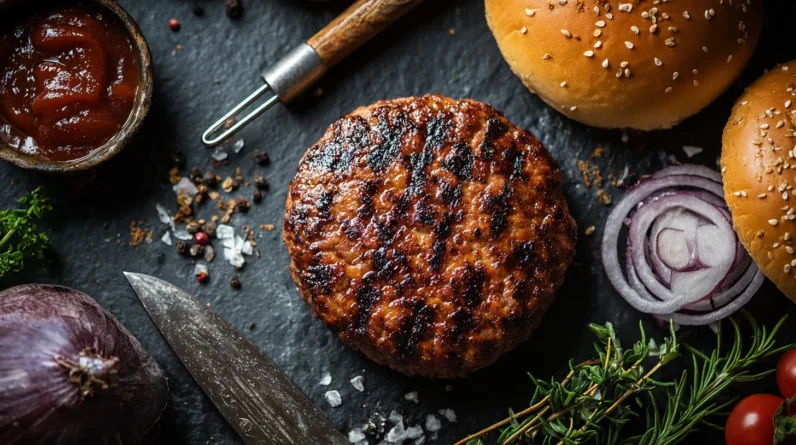
We’ve got multiple delicious alternatives to beef burgers that’ll satisfy health-conscious guests while delivering impressive nutritional benefits. Plant-based options like black bean patties pack 15g of protein per cup with added fiber, while seitan offers a whopping 75g of protein per 100g serving. Turkey and chicken variations provide lean protein at around 20g per serving with half the fat of beef. Mushroom-based patties offer rich umami flavor with just 22 calories per 100g, plus essential selenium and B vitamins. Quinoa burgers deliver complete protein with all nine essential amino acids. These nutrient-dense alternatives open up a world of healthy, flavorful possibilities.
Plant-Based Protein Burger Options
In recent years, plant-based protein burgers have emerged as nutritious alternatives to traditional beef patties. We’re seeing impressive innovations in meat substitutes using proteins from legumes, grains, and vegetables. Black bean burgers deliver fiber and protein while maintaining a satisfying texture, while quinoa-based patties offer complete protein with all essential amino acids.
Let’s explore other protein-rich options that work well in burger form. Tempeh, made from fermented soybeans, provides 31 grams of protein per cup and beneficial probiotics. Seitan, derived from wheat gluten, contains 75 grams of protein per 100 grams, making it one of the most protein-dense plant foods available. When combined with mushrooms, nuts, or chickpeas, these proteins create patties that rival beef’s nutritional profile while reducing saturated fat intake.
Mushroom and Veggie Patties
Versatility makes mushroom and veggie patties an excellent choice for health-conscious burger lovers. We can create nutrient-dense patties using portobello mushrooms, which provide selenium, B vitamins, and antioxidants, while containing just 22 calories per 100g serving. By combining mushrooms with vegetables like carrots, onions, and bell peppers, we’re adding essential vitamins A, C, and K.
To guarantee our patties hold together, we’ll incorporate binding agents such as ground flaxseed or chickpea flour, which boost omega-3 fatty acids and protein content. These ingredients also provide necessary fiber – up to 8g per patty when properly formulated. We can enhance the umami flavor profile by adding tamari or nutritional yeast, which contributes B12 and protein without excessive sodium or saturated fats typically found in beef burgers.
Turkey and Chicken Variations
While beef burgers contain more saturated fat and cholesterol, turkey and chicken patties offer leaner protein alternatives with impressive nutritional profiles. A 4-ounce turkey patty provides roughly 22 grams of protein while containing only 150 calories and 8 grams of fat. Chicken patties deliver similar benefits, with about 20 grams of protein and 7 grams of fat per serving.
We can enhance these poultry patties’ nutritional value by incorporating finely diced vegetables like bell peppers, onions, and carrots. Adding herbs such as sage, thyme, or rosemary not only boosts flavor but also introduces beneficial antioxidants. To maintain moisture, we’ll mix in ingredients like Greek yogurt or pureed vegetables. These additions help prevent the common problem of dry poultry burgers while keeping the fat content notably lower than beef alternatives.
Grain-Based Burger Recipes
Grains form the foundation of hearty plant-based burger alternatives that deliver complex carbohydrates, fiber, and essential B vitamins. We’ll show you how to transform wholesome grains into satisfying patties that provide sustained energy and complete protein when combined with legumes.
– Quinoa-based burgers pack 8g of protein per serving and contain all nine essential amino acids
– Brown rice and mushroom patties offer umami flavor while providing selenium and B vitamins
– Millet burgers deliver magnesium and tryptophan, supporting both bone health and sleep
– Bulgur wheat patties contain prebiotic fiber that feeds beneficial gut bacteria
– Amaranth-based burgers provide lysine and calcium, nutrients often lacking in vegetarian diets
Let’s bind these grains with flax eggs, which add omega-3 fatty acids while ensuring our patties hold together perfectly during cooking. We’ll achieve ideal texture by pulsing ingredients briefly rather than over-processing.
Legume Patties For Every Palate
From chickpeas to black beans, legumes serve as protein powerhouses for creating satisfying meatless burgers. We’ll explore how these versatile ingredients deliver essential amino acids while providing substantial fiber content that aids in satiety and digestive health.
When crafting legume patties, we combine mashed beans or lentils with binding agents like ground flaxseed or chickpea flour, which provide structural integrity while adding omega-3 fatty acids. We’ve found that black beans offer 15 grams of protein per cup, while lentils pack even more at 18 grams. Let’s incorporate aromatics like garlic and onions, which not only enhance flavor but also contribute beneficial organosulfur compounds.
For ideal texture, we’ll pulse ingredients rather than puree them, maintaining some structural integrity. This technique creates patties that hold together while delivering the satisfying mouthfeel we’re seeking.
Conclusion
Making the switch from beef burgers to healthier alternatives isn’t just about changing what’s on our plates – it’s about transforming our relationship with food. Like a bridge between tradition and wellness, these nutrient-dense options offer higher fiber, lower saturated fats, and fewer calories while delivering essential proteins. We’re empowered to nourish our bodies with wholesome ingredients that symbolize a commitment to both personal health and environmental sustainability. Let’s embrace these mindful choices together.







